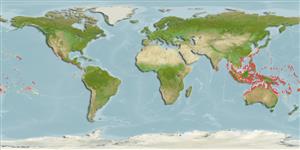分類 / Names
共通名の | 類義語 | Catalog of Fishes(部類, 種) | ITIS | CoL | WoRMS | Cloffa
>
Blenniiformes (Blennies) >
Blenniidae (Combtooth blennies) > Blenniinae
Etymology: Aspidontus: Greek, aspis, -idos = shield + Latin, dens, dentis = teeth (Ref. 45335).
More on authors: Quoy & Gaimard.
Environment: milieu / climate zone / depth range / distribution range
生態学
海 関連する礁; 深さの範囲 1 - 25 m (Ref. 90102). Tropical; 32°N - 32°S
Indo-Pacific.
サイズ / 重さ / 年齢
Maturity: Lm ? range ? - ? cm
Max length : 11.5 cm TL オス/雌雄の選別がない; (Ref. 9710)
背面の脊椎 (合計) : 10 - 12; 背鰭 (合計) : 26 - 28; 肛門の骨: 2; 臀鰭: 25 - 28. Bears an amazing resemblance to the cleaner wrasse, Labroides dimidiatus. Distinguished from L. dimidiatus by the position of its mouth, which is terminal in the wrasse but under the snout in the blenny.
Adults are found solitary or in small groups (Ref. 90102) in lagoons, subtidal reef flats and outer reef slopes (where it occurs to depths of over 20 m). Often in pairs in empty worm tubes or narrow holes. They mimic the cleaner wrasse Labroides dimidiatus and nip fins, skin and scales of other fishes (Ref. 9710). They even copy the motion of the cleaner wrasse that may induce other fish to come close, then target their scales or mucus for a feed, biting and quickly retreating to the corals before the victim realizes that it was tricked; experienced fish recognize imposters and often give it a chase (Ref. 48636). Diet is supplemented with benthic invertebrates and zooplankton (Ref. 94105). Also feed on tubeworms and demersal fish eggs. Oviparous. Eggs are demersal and adhesive (Ref. 205), and are attached to the substrate via a filamentous, adhesive pad or pedestal (Ref. 94114). Larvae are planktonic, often found in shallow, coastal waters (Ref. 94114).
Life cycle and mating behavior
成熟 | 繁殖 | 放精 | 卵 | 生産力 | 幼生
Distinct pairing (Ref. 205).
Smith-Vaniz, W.F., B.C. Victor and G.R. Allen, 2020. Aggressive mimicry in Aspidontus and Plagiotremus (Pisces: Blenniidae): some mimetic phenotypes are not phylogenetically informative. J. Ocean Sci. Found. 35:118-128. (Ref. 123078)
IUCNのレッドリストの状況は (Ref. 130435: Version 2024-1)
Human uses
水産業: 商業; 水族館・水槽: 商業
用具
特記事項
XMLをダウンロードして下さい
インターネットの情報源
Estimates based on models
Preferred temperature (Ref.
123201): 25.1 - 29.3, mean 28.5 °C (based on 2575 cells).
Phylogenetic diversity index (Ref.
82804): PD
50 = 0.6250 [Uniqueness, from 0.5 = low to 2.0 = high].
Bayesian length-weight: a=0.00575 (0.00253 - 0.01308), b=3.06 (2.86 - 3.26), in cm total length, based on LWR estimates for this (Sub)family-body shape (Ref.
93245).
栄養段階 (Ref.
69278): 3.8 ±0.51 se; based on food items.
回復力 (Ref.
120179): 高い, 15か月以下の倍増期間の最小個体群 (Preliminary K or Fecundity.).
Fishing Vulnerability (Ref.
59153): Low vulnerability (10 of 100).
Nutrients (Ref.
124155): Calcium = 122 [63, 203] mg/100g; Iron = 0.806 [0.483, 1.330] mg/100g; Protein = 18.4 [17.3, 19.4] %; Omega3 = 0.103 [0.058, 0.181] g/100g; Selenium = 22.6 [11.3, 49.0] μg/100g; VitaminA = 225 [82, 635] μg/100g; Zinc = 1.57 [1.05, 2.26] mg/100g (wet weight);
